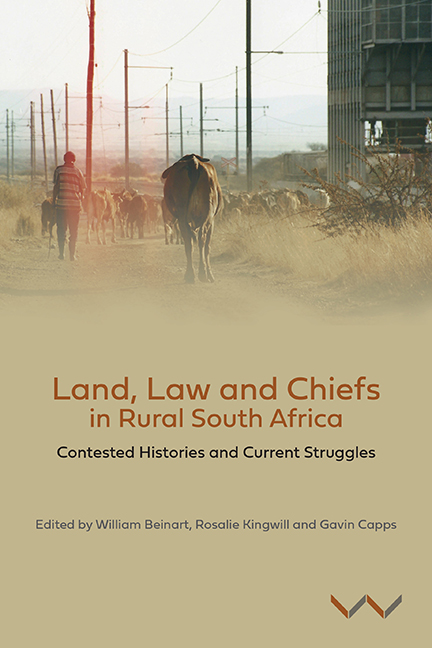Book contents
- Frontmatter
- Contents
- Maps
- Acronyms and Abbreviations
- Preface
- Introduction Land, Law and Chiefs: Contested Histories and Current Struggles
- Chapter 1 Constitutional Court Judgments, Customary Law and Democratisation in South Africa
- Chapter 2 Was ‘Living Customary Law’ There All Along?
- Chapter 3 When Custom Divides ‘Community’: Legal Battles over Platinum in North West Province
- Chapter 4 Chiefs, Mines and the State in the Platinum Belt: The Bapo-ba-Mogale Traditional Community and Lonmin
- Chapter 5 Mining, Graves and Dispossession in Mpumalanga
- Chapter 6 The Abuse of Interdicts by Traditional Leaders in South Africa
- Chapter 7 Resisting the Imposition of Ubukhosi: Contested Authority-Making in the Former Ciskei
- Chapter 8 Black Landlords, Their Tenants and the Native Administration Act of 1927
- Chapter 9 Customary Law and Landownership in the Eastern Cape
- Chapter 10 A History of Communal Property Associations in South Africa
- Chapter 11 ‘This is Business Land’: The Hlolweni Land Claim, 1983–2016
- Chapter 12 Restitution and Land Rights in the Eastern Cape: The Hlolweni, Mgungundlovu and Xolobeni Cases
- Contributors
- Index
Chapter 3 - When Custom Divides ‘Community’: Legal Battles over Platinum in North West Province
Published online by Cambridge University Press: 15 June 2021
- Frontmatter
- Contents
- Maps
- Acronyms and Abbreviations
- Preface
- Introduction Land, Law and Chiefs: Contested Histories and Current Struggles
- Chapter 1 Constitutional Court Judgments, Customary Law and Democratisation in South Africa
- Chapter 2 Was ‘Living Customary Law’ There All Along?
- Chapter 3 When Custom Divides ‘Community’: Legal Battles over Platinum in North West Province
- Chapter 4 Chiefs, Mines and the State in the Platinum Belt: The Bapo-ba-Mogale Traditional Community and Lonmin
- Chapter 5 Mining, Graves and Dispossession in Mpumalanga
- Chapter 6 The Abuse of Interdicts by Traditional Leaders in South Africa
- Chapter 7 Resisting the Imposition of Ubukhosi: Contested Authority-Making in the Former Ciskei
- Chapter 8 Black Landlords, Their Tenants and the Native Administration Act of 1927
- Chapter 9 Customary Law and Landownership in the Eastern Cape
- Chapter 10 A History of Communal Property Associations in South Africa
- Chapter 11 ‘This is Business Land’: The Hlolweni Land Claim, 1983–2016
- Chapter 12 Restitution and Land Rights in the Eastern Cape: The Hlolweni, Mgungundlovu and Xolobeni Cases
- Contributors
- Index
Summary
L and conflict has increased in sub-Saharan Africa, particularly in the context of land grabs, mounting scarcity, commodification of customary land rights and landed resources, competition and emerging inequality (Peters 2004; Chimhowu and Woodhouse 2006; Mnwana 2015). In South Africa, perhaps more than anywhere else in the African continent, land has long been a major cause and outcome of racial inequality. With more than 17 million Africans still living in the former ‘homelands’ or Bantustans, whose land tenure rights remain poorly defined and insecure, South Africa's history of racial exclusion of Africans from landownership remains central to the ongoing struggles over land.
This chapter details the intense local land struggles over the platinum-rich land in South Africa's North West province. The central argument is that land disputes tend to be struggles over meanings of ‘community’ and ‘property’ at local level. Such struggles are mainly fought through contending versions of custom and distinct group identities. These disputes take the form of exclusive group claims over the platinum-rich land. Some of these claims have led to lengthy court battles between the groups of land claimants at village level and the local chief. I argue that since African ‘rights’ and ‘property’ in rural land are defined through custom, custom has become central in how meanings of ‘property’ and ‘community’ are defined and redefined in contemporary struggles. Ironically, despite increasing reference to living customary law, the courts have quite often continued to define custom as a rigid set of rules, which remains unchanged and is carried on from one generation to the next. I argue that such a description not only fails to capture the complexities of South Africa's rural social milieu, it also perpetuates inequality and property disputes at village level, particularly when communal land is targeted for mining expansion.
IDEOLOGICAL PREMISE
Far from being idyllic rural cultural enclaves, South Africa's former homeland areas are, and have long been, geo-political spaces of resistance and socio-economic marginalisation. These were the colonial ‘native reserves’ where the white minority governments (the colonial, Union and apartheid states) dumped millions of land-dispossessed Africans at different historical moments. As such, it would be limiting to describe rural Africans in these spaces as historically or even currently members of homogeneous political and cultural ‘communities’ whose interests could be legitimately represented only by local chiefs.
- Type
- Chapter
- Information
- Land, Law and Chiefs in Rural South AfricaContested histories and current struggles, pp. 60 - 80Publisher: Wits University PressPrint publication year: 2021



